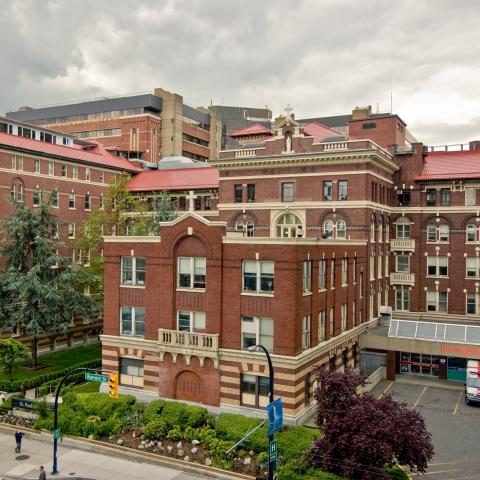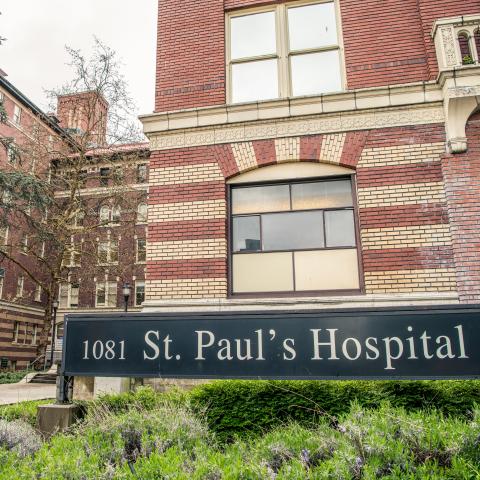Ulcerative colitis
An overview of Providence Health Care's services and resources for adults living with ulcerative colitis.
Overview
Ulcerative colitis (UC) is a chronic inflammatory bowel disease. It causes inflammation and ulcers in the lining of the colon and rectum.
It tends to develop slowly over time. Symptoms include abdominal pain, bloody diarrhea, rectal bleeding, and urgency to have a bowel movement.
No one knows what causes UC, but it is likely caused by both genetic and environmental factors.
UC is distinct from Crohn’s disease, which is another chronic inflammatory bowel disease.
Contact
Pacific Gastroenterology Associates
770 – 1190 Hornby Street
Vancouver, BC, V6Z 2K5
Diagnosis & testing
If you have symptoms of UC, we will send you for lab tests to rule out other conditions or complications.
Lab tests may include:
- Blood tests check for infection, inflammation, and anemia. Anemia is when you don't have enough healthy red blood cells.
- Stool samples to look for the presence of white blood cells. Stool samples also look for specific proteins called fecal calprotectin. Both white blood cells and fecal calprotectin are markers of UC and distinguish it from Crohn’s Disease.
Next, we may send you for an endoscopic procedure and tissue biopsy at the Gastrointestinal (GI) Clinic at St. Paul’s Hospital. An endoscopy is a minimally invasive procedure. It examines your digestive system with a thin, flexible tube attached to a camera.
Endoscopy procedures to diagnose UC include:
- Colonoscopy, a procedure specific to the entire colon.
- Flexible sigmoidoscopy, a procedure specific to the lower part of your colon and rectum.
Finally, we may send you for imaging tests. These will help confirm the exact location of your UC. We'll also want to confirm no other conditions are causing your symptoms.
Imaging tests may include:
- X-rays of your abdomen.
- Computerized tomography (CT) scans of your abdomen and pelvis.
- CT enterography and MRI enterography of your small intestines.
Treatment & management
There is no cure for UC, but treatment can control inflammation. It can also reduce symptoms and encourage remission.
Treatment typically involves prescribed medications and, in some cases, surgery.
Your treatment plan will be based on the location and severity of your UC infection. Your plan will also depend on how your body responds to medications. Many medicines that treat UC have significant side effects.
Clinics that treat ulcerative colitis
Surgery
About one in three adults with UC will eventually need surgery to remove a diseased segment of the intestine.
We perform bowel surgery at St. Paul’s Hospital Colorectal Surgery Centre.
If you need surgery for your UC, you will be referred to one of PHC’s colorectal surgeons. They will discuss your surgery and treatment options with you.
Support services
Providence offers a variety of services to support those we care for. The following services may be of use or benefit to you and your families.
Support for Indigenous Peoples
The Indigenous Wellness Liaison Team is here to support your health journey. Team members offer cultural support and healthcare advocacy. Learn more below or call them at 604-682-2344,62937 or email IWL@providencehealth.bc.ca.
Education & resources
Patient education
Clinical trials & research
Advances in ulcerative colitis treatments are all thanks to medical research. While participating in research is a decision you should make for yourself in consultation with your care team, there is much activity in this area so please ask us about our research programs if you’re interested.
By taking part in research, you can help us all learn more about ulcerative colitis and find better ways to help people like you live and thrive with the condition. While you cannot assume benefit to yourself, your participation can make a difference in improving care for future patients.
The following clinical trials are currently enrolling volunteers. Please ask your care team for more information or contact the research team listed on each study or trial. For other information about research at Providence Health Care, please visit Providence Research.


